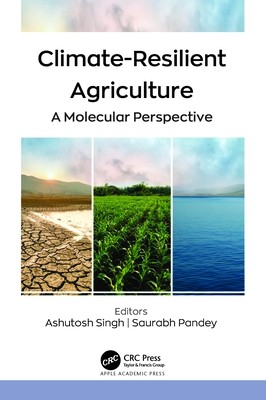
- We will send in 10–14 business days.
- Publisher: Apple Academic Press
- ISBN-10: 1774915065
- ISBN-13: 9781774915066
- Format: 15.6 x 23.4 x 3.2 cm, hardcover
- Language: English
- SAVE -10% with code: EXTRA
Climate-Resilient Agriculture (e-book) (used book) | bookbook.eu
Reviews
Description
Developing climate-smart crops is vital to securing food security around the world. This new volume, Climate-Resilient Agriculture: A Molecular Perspective, covers the current aspects of climate-resilient agriculture, including the crucial physiological, biochemical, and molecular aspects of cultivated crops under stress conditions, which play a pivotal role in developing climate-smart crops. This book discusses the current state of climate change and its effect on crop diversity and germplasm. The primary focus of the volume is on advanced technologies and approaches in the development of crops that can withstand adverse climate scenarios. The volume explores breeding, omics, genetic engineering, bioengineering of metabolic pathways, and artificial intelligence. Each has been laid out with systematic approaches to developing abiotic stress-tolerant genotypes using biotechnological tools.
Key features:
- Addresses the current and future challenges of climate changes on food security
- Details the impact of different biotic, abiotic stresses, their interaction, and effect on crop plants in climate-changing scenarios
- Gives a comprehensive account of molecular mechanisms associated with different stresses in crop plants
- Discusses advances in breeding and biotechnological techniques to tackle the different stresses in challenging climatic fluctuations
- Highlights various emerging approaches and technologies currently being used in developing climate-smart crops
- Provides success stories of crop improvement against the different stresses.
This book covers the crucial advanced technologies that can help to mitigate plant abiotic stresses in cultivated crops and will familiarize readers with state-of-the-art advances in climate-resilience agriculture. The volume will benefit researchers, plant scientists, environmental biologists, faculty, and students in diverse fields of agriculture.
EXTRA 10 % discount with code: EXTRA
The promotion ends in 20d.07:44:36
The discount code is valid when purchasing from 10 €. Discounts do not stack.
- Publisher: Apple Academic Press
- ISBN-10: 1774915065
- ISBN-13: 9781774915066
- Format: 15.6 x 23.4 x 3.2 cm, hardcover
- Language: English English
Developing climate-smart crops is vital to securing food security around the world. This new volume, Climate-Resilient Agriculture: A Molecular Perspective, covers the current aspects of climate-resilient agriculture, including the crucial physiological, biochemical, and molecular aspects of cultivated crops under stress conditions, which play a pivotal role in developing climate-smart crops. This book discusses the current state of climate change and its effect on crop diversity and germplasm. The primary focus of the volume is on advanced technologies and approaches in the development of crops that can withstand adverse climate scenarios. The volume explores breeding, omics, genetic engineering, bioengineering of metabolic pathways, and artificial intelligence. Each has been laid out with systematic approaches to developing abiotic stress-tolerant genotypes using biotechnological tools.
Key features:
- Addresses the current and future challenges of climate changes on food security
- Details the impact of different biotic, abiotic stresses, their interaction, and effect on crop plants in climate-changing scenarios
- Gives a comprehensive account of molecular mechanisms associated with different stresses in crop plants
- Discusses advances in breeding and biotechnological techniques to tackle the different stresses in challenging climatic fluctuations
- Highlights various emerging approaches and technologies currently being used in developing climate-smart crops
- Provides success stories of crop improvement against the different stresses.
This book covers the crucial advanced technologies that can help to mitigate plant abiotic stresses in cultivated crops and will familiarize readers with state-of-the-art advances in climate-resilience agriculture. The volume will benefit researchers, plant scientists, environmental biologists, faculty, and students in diverse fields of agriculture.


Reviews